PREVIOUS
Nobel Prize Winners 2024
Nobel Prize Winners 2024
(இதன் தமிழ் வடிவத்திற்கு இங்கே சொடுக்கவும்)
Introduction
- The Nobel Prize is a prestigious set of international awards established by Alfred Nobel (Sweden).
- It is honoring outstanding contributions to humanity in various fields.
Alfred Nobel: Founder of the Nobel Prize
- Alfred Nobel, a multifaceted inventor, entrepreneur, scientist, and writer, created the Nobel Prizes through his will upon his death.
- He is known for inventing dynamite and holding 355 patents.
- His diverse interests are reflected in the Nobel prizes he established in 1895.
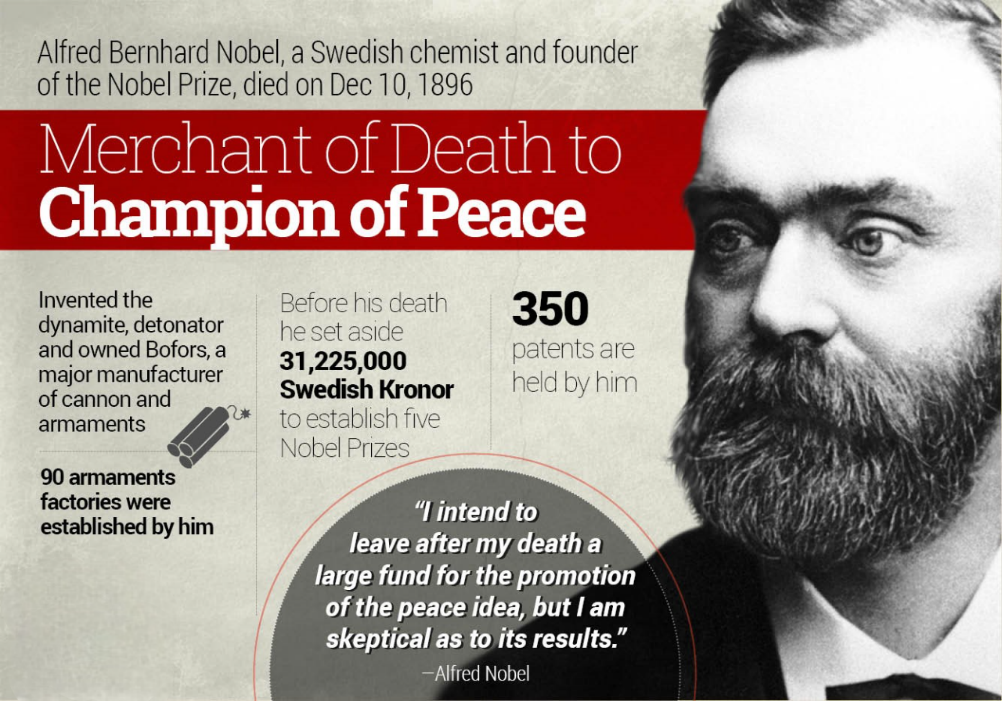
Purpose and Philosophy
- Nobel’s will specified that the awards should be given to individuals or organizations that have provided "the greatest benefit to humankind" in the preceding year.
- This principle underlies the selection of laureates across various disciplines.
Prize Categories
- The Nobel Prizes are awarded in the following categories:
- Physics
- Chemistry
- Physiology or Medicine
- Literature
- Economics
- Peace
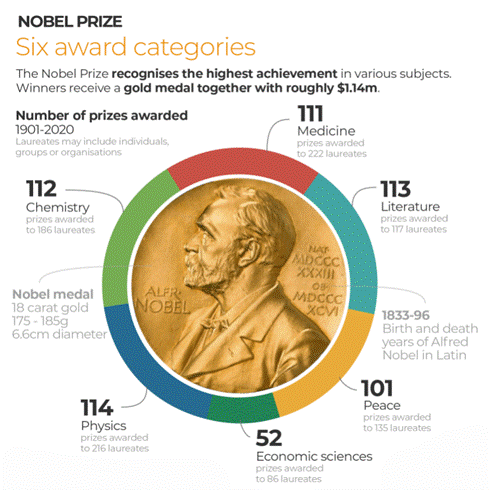
- In 1968, the Sveriges Riksbank introduced the Sveriges Riksbank Prize in Economic Sciences in Memory of Alfred Nobel, expanding the range of recognized achievements.
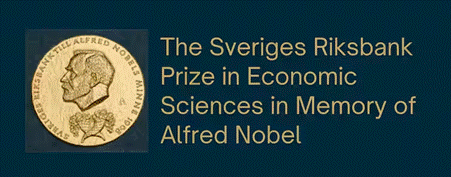
History and Awards
- The first Nobel Prizes were awarded in 1901, and the tradition continues annually, though there have been interruptions during the World Wars.
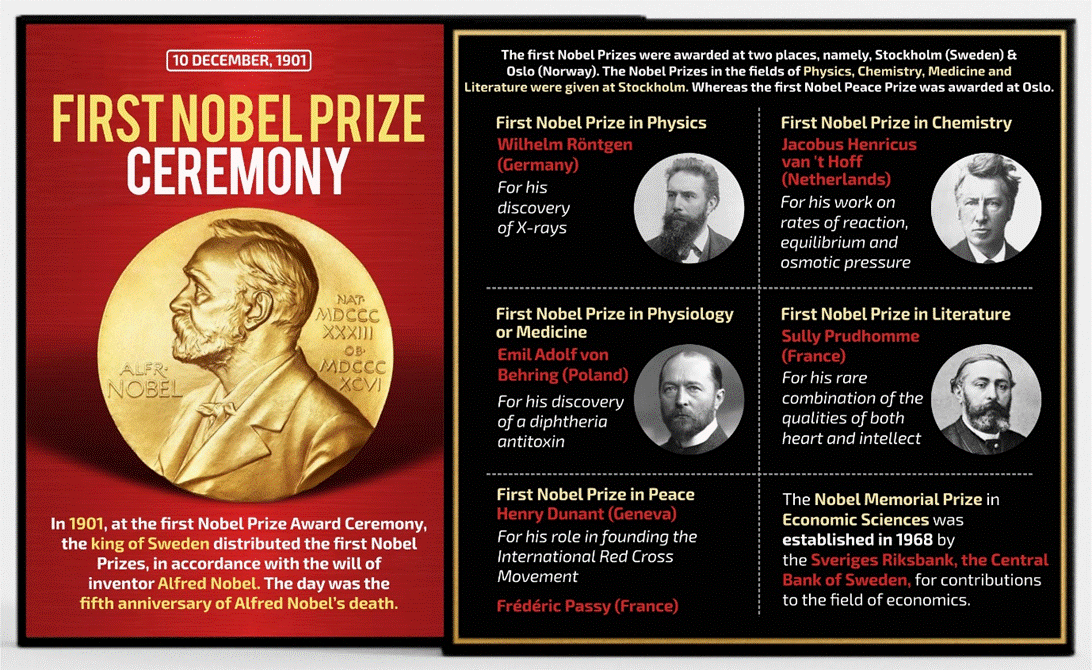
Nobel Day
- Celebrated on December 10 each year, Nobel Day commemorates the anniversary of Alfred Nobel’s death and is the occasion for the presentation of the awards to the laureates.
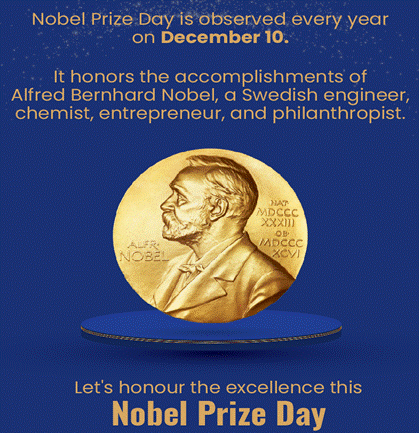
The Nobel Foundation
- Founded in 1900, the Nobel Foundation is responsible for managing Nobel's fortune.
- This ensures the long-term sustainability of the prizes.
- It maintains the independence of the prize-awarding institutions and works to promote the Nobel legacy through various outreach initiatives.
Facts About the Nobel Prize
Nobel Prize Components
- Recognition Items: Laureates receive a Nobel Prize diploma, a medal, and a document detailing the prize amount, which for this year is 10 million Swedish krona (approximately $900,000).
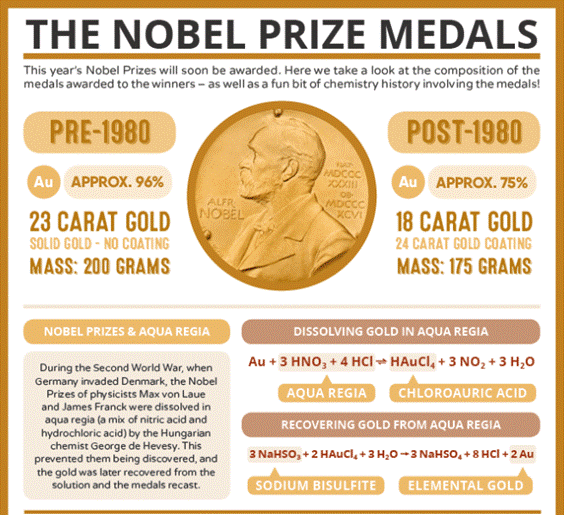
Prize Distribution
- Sharing the Prize: The Nobel Prize can be awarded to up to three individuals.
- The Peace Prize can also be awarded to organizations.
Awarding Conditions
- Posthumous Awards: The Nobel Prize cannot be awarded posthumously, but since 1974, if a nominee dies after the announcement, they may still receive the award.
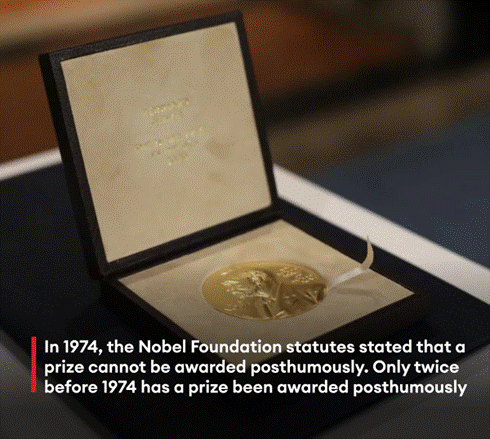
Selection Process
- Responsible Institutions: Alfred Nobel designated specific institutions for prize selection:
- The Royal Swedish Academy of Sciences for Physics and Chemistry.
- Karolinska Institute for Physiology or Medicine.
- The Swedish Academy for Literature.
- A committee elected by the Norwegian Parliament for the Peace Prize.
Awarding the prize
- Nobel is awarded in the fields of physics, chemistry, physiology or medicine, literature, and economics at Stockholm, Sweden.
- The Peace Prize is the only Nobel Prize not presented in Stockholm (Sweden).
- In Oslo (Norway) the Nobel Peace Prize is presented by the chairman of the Norwegian Nobel Committee in the presence of the King and Queen of Norway.
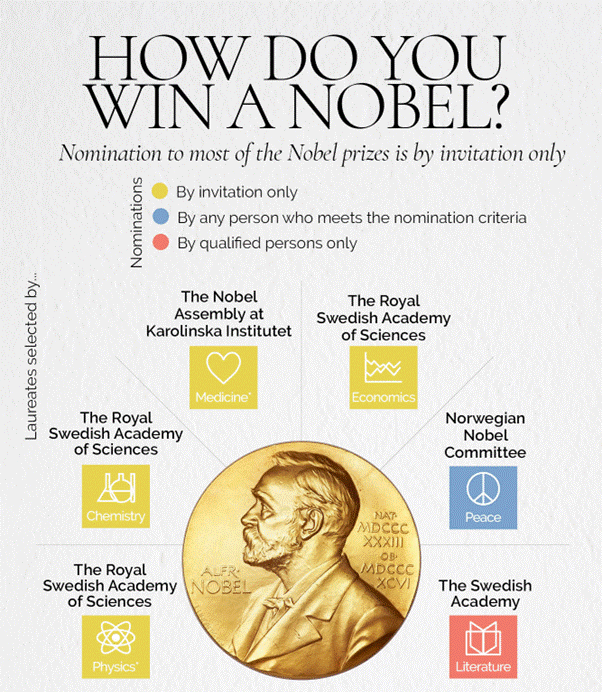
- Nominations: To become a Nobel Laureate, one must be nominated by an eligible nominator; self-nomination is not allowed.
- Nominations are exclusive and require an invitation, with criteria established by the awarding bodies.
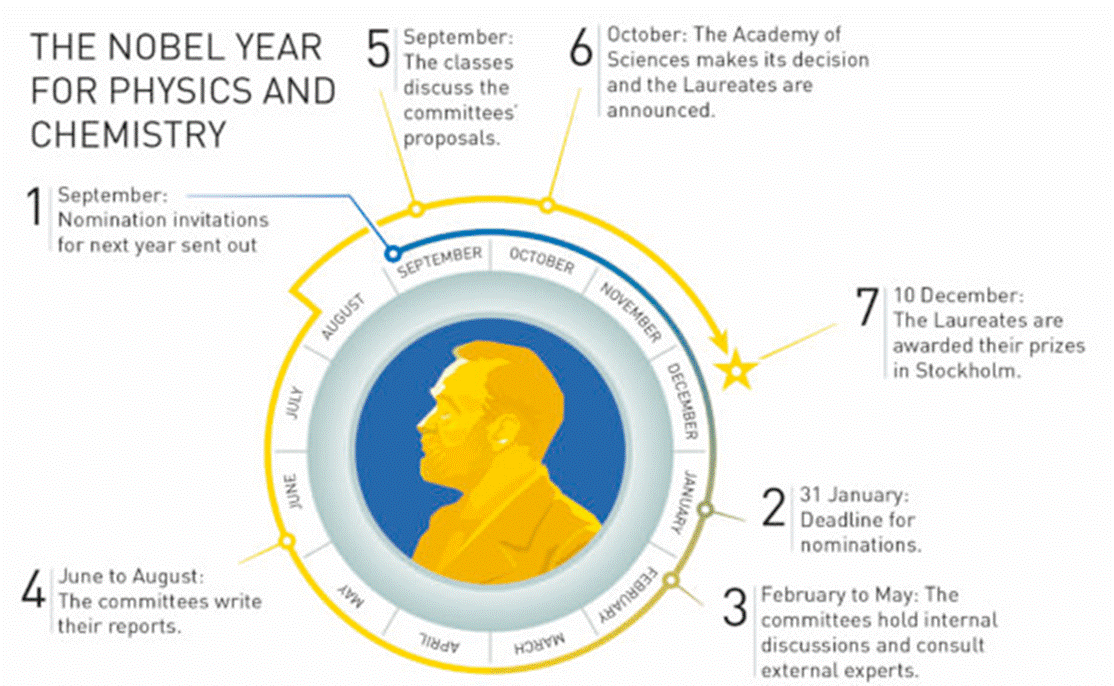
Notable Laureates
- Young Laureate: Malala Yousafzai won the Nobel Peace Prize in 2014 at the age of 17, becoming the youngest Nobel laureate.
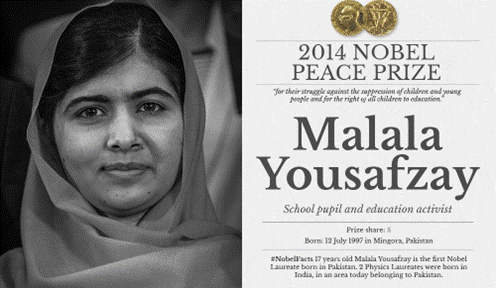
- Oldest Nobel Laureate: 2019 Chemistry Laureate John B. Goodenough received the Nobel Prize at the age of 97, making him the oldest Nobel laureate.
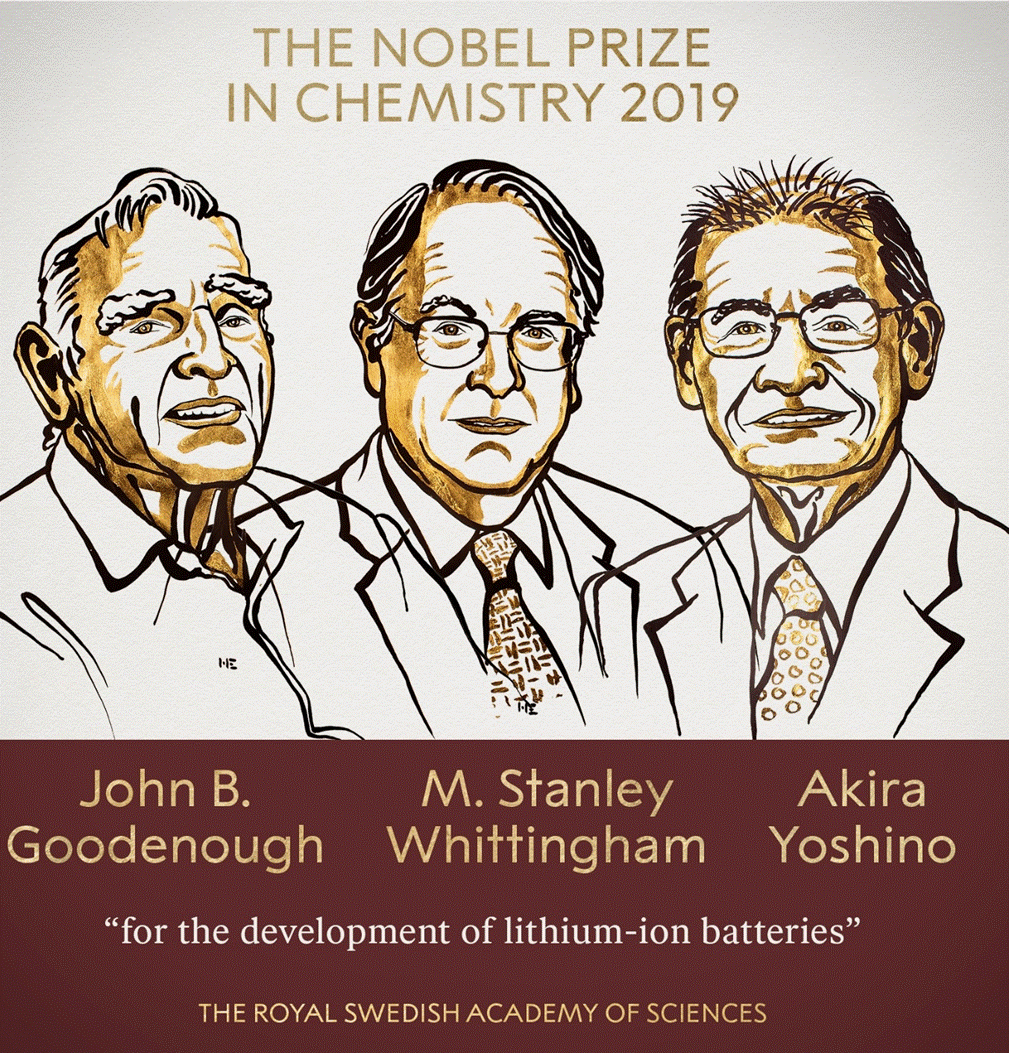
- Twice Honored: Marie Curie is the only woman to have received the Nobel Prize twice, earning the Physics Prize in 1903 and the Chemistry Prize in 1911.
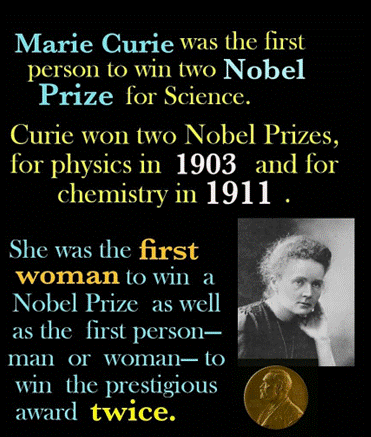
Revocation of Awards
- Irrevocability: Once awarded, a Nobel medal cannot be revoked, as stated in Alfred Nobel's will and the statutes of the Nobel Foundation.
Indian Nobel Laureates
- India has produced 12 Nobel laureates to date, consisting of five Indian citizens and seven individuals of Indian ancestry or residency.
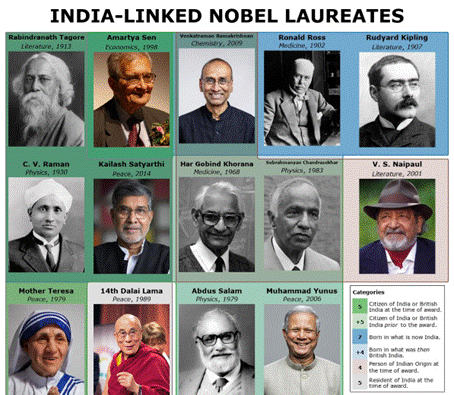
Notable Indian Laureates
- Rabindranath Tagore:
- Rabindranath Tagore won the Nobel Prize in 1913.
- He is the first Indian citizen and the first person in Asia to receive this award for his contributions to literature.
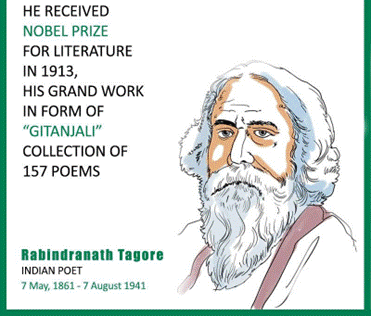
- Mother Teresa:
- She was the only woman among the Indian Nobel laureates.
- She was recognized for her humanitarian work and received the Nobel Peace Prize in 1979.
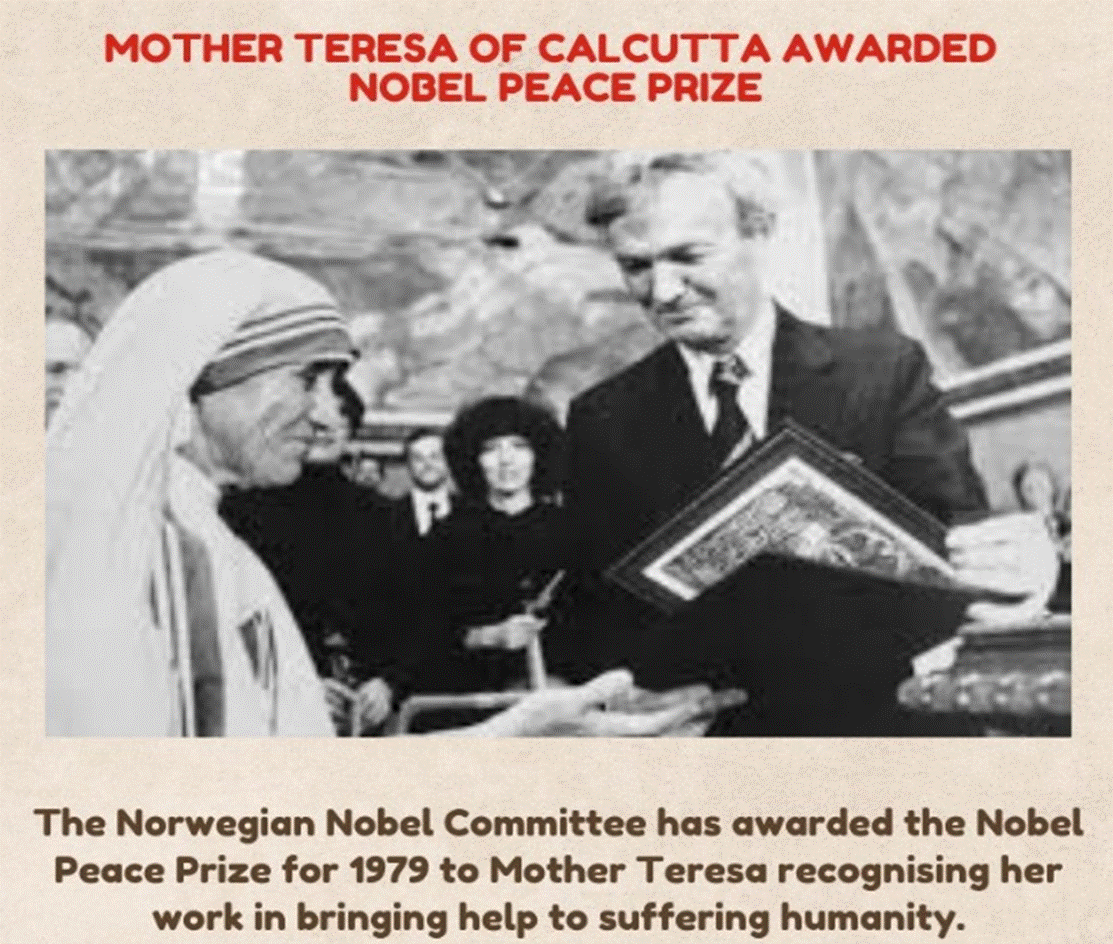
- These laureates represent India's rich cultural and intellectual heritage on the global stage.
Following are the Nobel laureates from India (British India and Independent India):
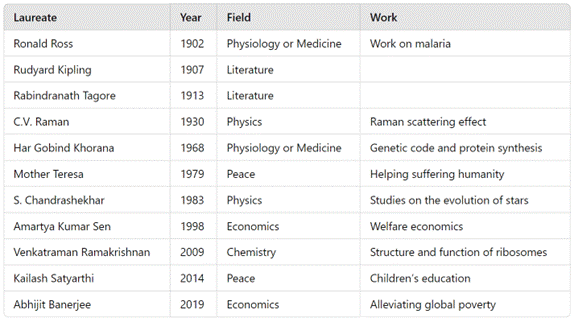
Nobel Prize in Medicine 2024
- Laureates: Victor Ambros (USA) and Gary Ruvkun (USA)
Discovery of MicroRNA and Its Role in Gene Regulation
- Victor Ambros and Gary Ruvkun's recognized work centers on the discovery of microRNA.
- They explored its function in post-transcriptional gene regulation.
- Their studies focused on the roundworm C. elegans.
- They identified how the lin-4 microRNA inhibits the protein production of the lin-14 gene.

Impact of Their Research:
- Gene Regulation Insight: Understanding microRNA’s function is vital for various biological processes, as it controls protein production.
- Disruptions in this regulation can lead to diseases such as cancer and diabetes.
- Medical Relevance: Their findings emphasize microRNA's role in both preventing and contributing to numerous diseases, including cancer, diabetes, and autoimmune disorders.
- For instance, mutations in microRNA-related genes can result in congenital hearing loss or skeletal disorders.
- Therapeutic Applications: Research into microRNA-based treatments is underway, with potential for targeted therapies aimed at genetic disorders.
- Therapeutic strategies may include modifying microRNA activity to address specific cancers.
- Evolutionary Significance: MicroRNAs have played a crucial role in genetic evolution for millions of years, influencing the development of cells and tissues in multicellular organisms.
- Abnormal microRNA activity has been associated with various developmental disorders.
Nobel Prize in Physics 2024 Winners
Laureates:
- John Hopfield (Princeton University, U.S.)
- Geoffrey Hinton (University of Toronto, Canada)
Contributions:
- Hopfield Network: John Hopfield developed a recurrent neural network based on Hebbian learning principles, applying statistical physics to enhance tasks such as pattern recognition.
- Restricted Boltzmann Machine (RBM):
- Geoffrey Hinton transformed deep learning through improvements in neural networks, allowing them to process complex data more effectively.
- This work has significantly enhanced the power of artificial intelligence.
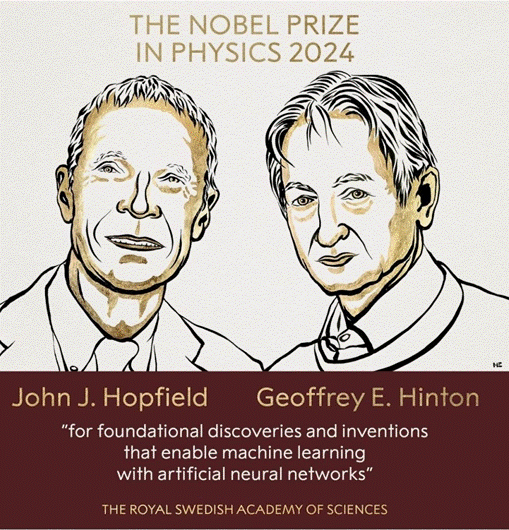
Impact of their work:
- Foundation for AI: Their innovations established the basis for machine learning, enabling AI systems to learn and adapt effectively.
- Advancements in Deep Learning: Hinton’s work has allowed AI models to tackle intricate tasks, including natural language processing.
- Broad AI Applications: Their contributions underpin technologies like chatbots and image recognition systems.
- Physics in AI Integration: Hopfield’s methodologies enhanced computational efficiency when managing large datasets, bridging the fields of physics and artificial intelligence.
Nobel Prize in Chemistry 2024 Winners
Laureates:
- David Baker (USA): Acknowledged for his groundbreaking contributions to computational protein design.
- Demis Hassabis and John Jumper (USA): Awarded for the development of the AI model AlphaFold 2, which predicts protein structures.
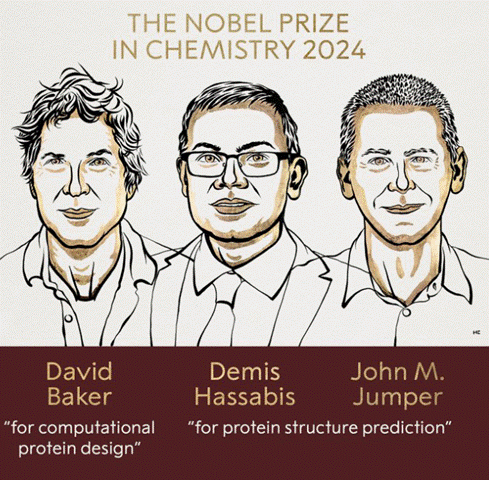
Contributions:
- David Baker: Developed innovative methods for designing new proteins using custom software, leading to the creation of 'designer' proteins tailored for specific applications.
- His team has been refining computational protein design since 2003, allowing for the construction of a diverse array of proteins.
- Demis Hassabis and John Jumper: Created AlphaFold 2, a groundbreaking AI model that can predict the structures of millions of proteins.
- AlphaFold 2 achieved a significant milestone in 2020 by accurately predicting complex protein structures, far exceeding previous manual methodologies.
Significance of their Work:
- Revolutionizing Protein Research: Their contributions enable the creation of custom proteins with specific applications.
- This innovation has the potential to transform fields such as drug discovery, biotechnology, and materials science.
- Accelerating Scientific Progress: The rapid prediction capabilities of AlphaFold 2 have drastically reduced research timelines, providing valuable insights into biological functions and disease mechanisms.
- Wider Impact on Chemistry: This award underscores the interdisciplinary nature of modern chemistry, highlighting the integration of AI and computational tools that broaden the field's horizons beyond traditional methods.
- Immediate Recognition: The prize was awarded just four to six years following Hassabis and Jumper’s breakthrough, emphasizing the swift impact of their work on contemporary scientific advancements.
2024 Nobel Prize in Economics Winners
Laureates:
- Daron Acemoglu (USA)
- Simon Johnson (USA)
- James Robinson (USA)
Research:
- The laureates were recognized for their groundbreaking research on wealth inequality between nations,
- It was examining how political and economic systems particularly those established by European colonizers affect long-term prosperity and societal institutions.
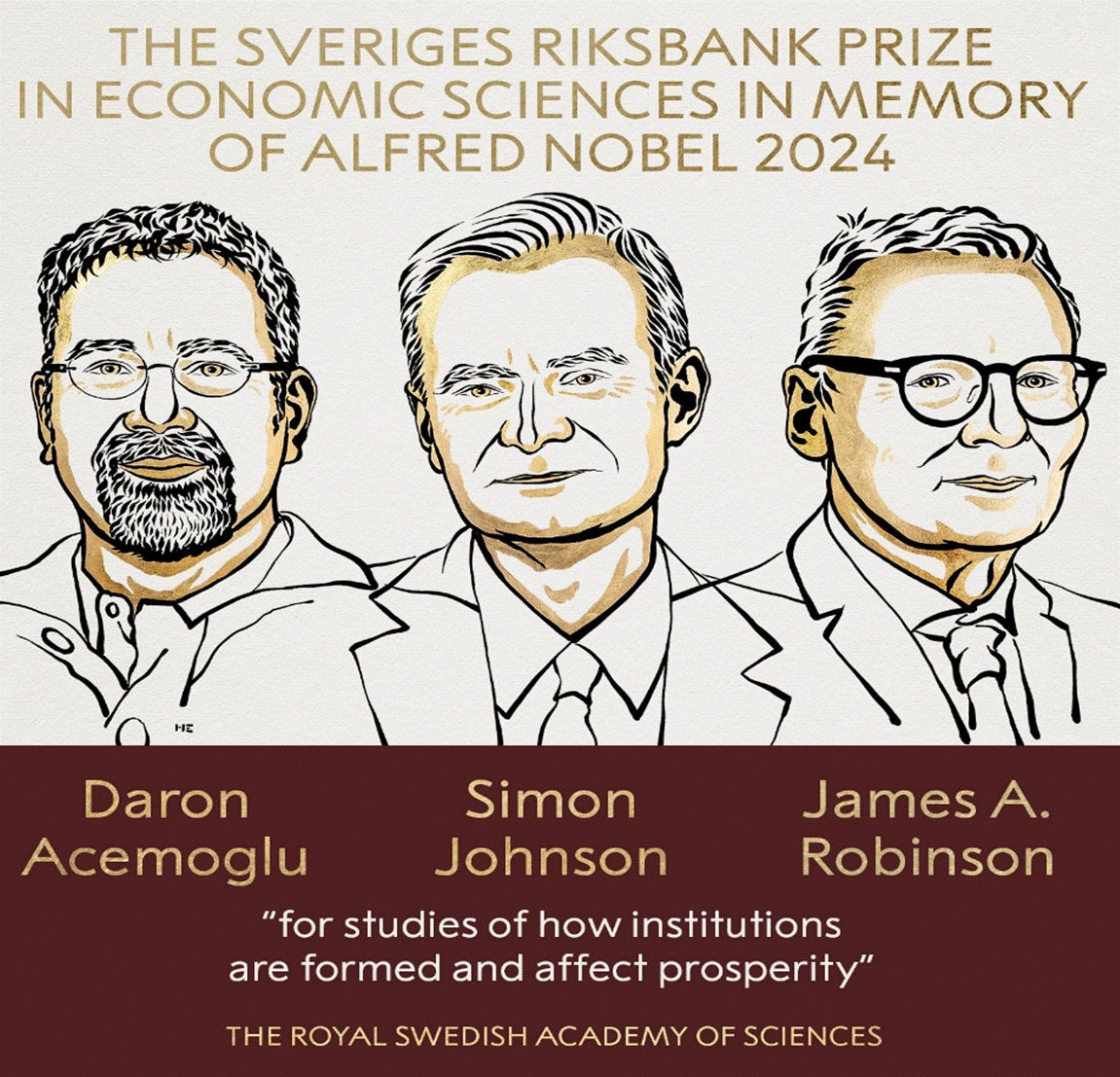
Overview of their Work:
- Study of Institutions: They analyzed the critical role of political and economic institutions in shaping the prosperity and development of nations.
- Impact of Colonialism: Their research delves into the systems imposed by European colonizers and their enduring effects on wealth inequality across nations.
- Comparative Studies: A notable example involves the comparison of Nogales, a city divided by the U.S.-Mexico border.
- It was illustrating how different institutional frameworks lead to varying levels of prosperity on either side.
- Focus on Democracy: Their findings indicate that countries transitioning to democratic governance tend to experience more rapid economic growth compared to those with non-democratic regimes.
- Publication: Acemoglu co-authored the influential book “Why Nations Fail” which explores the origins of economic disparity between nations.
Significance of their Work:
- Understanding Wealth Inequality: Their research sheds light on how institutional differences explain the varying levels of prosperity among countries.
- Importance of Institutions: They emphasize the necessity of inclusive political and economic institutions for achieving sustainable growth and reducing inequality.
- Practical Implications: Their insights inform policies aimed at reforming institutions in poorer countries to stimulate development.
- Global Relevance: The findings are key to solving the important problem of reducing the income gap between countries.
- Support for Democracy: Their work highlights the beneficial effects of democratic institutions on economic growth and societal development.
2024 Nobel Prize in Literature Winner
Laureate:
- Han Kang (South Korea)
Recognition:
- Awarded for her “intense poetic prose” that delves into historical traumas and human fragility.
- This recognition marks a departure from the recent trend of Europe-centric winners, with the Swedish Academy acknowledging her innovative contributions to contemporary prose.
About Han Kang and Her Works:
- Early Career: Han Kang began her literary journey with poetry, gaining significant recognition with her novel “The Vegetarian” (2007), which won the Man Booker International Prize in 2016.
Key Themes:
- Her writing frequently explores themes of patriarchy, violence, grief, and historical injustices, combining radical and poetic imagination with intense narratives.
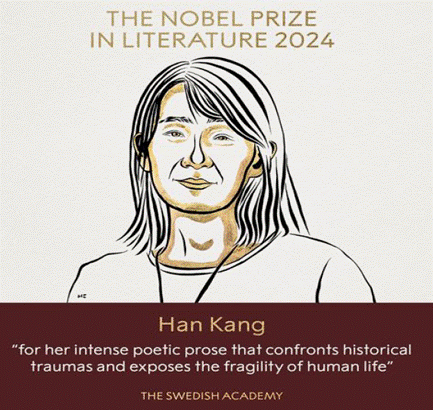
Notable Works:
- The Vegetarian: This novel examines a woman's choice to stop eating meat and the violent reactions from her family.
- Human Acts (2016): A poignant exploration of the 1980 Gwangju Uprising in South Korea, is giving voice to the victims of this historical event.
- The White Book (2017): A meditative reflection on grief and memory, is structured around the symbolism of the colour white.
- Greek Lessons (2023): A touching story about love and loss, is focusing on a woman who has lost her speech and a teacher who is losing his sight.
- We Do Not Part: Set against the backdrop of a hidden massacre in Korean history, this work explores collective trauma and memory.
Impact:
- Han Kang’s works have significantly broadened the global reach of Korean literature, showcasing its ability to engage with universal human experiences through empathy and depth.
2024 Nobel Peace Prize Winner
Laureate:
- Nihon Hidankyo (Japan)
Recognition:
- The 2024 Nobel Peace Prize was awarded to Nihon Hidankyo, a Japanese organization representing the survivors of the Hiroshima and Nagasaki atomic bombings, known as “Hibakusha.”
- The award recognized their tireless efforts to promote nuclear disarmament and highlight the catastrophic effects of nuclear weapons.
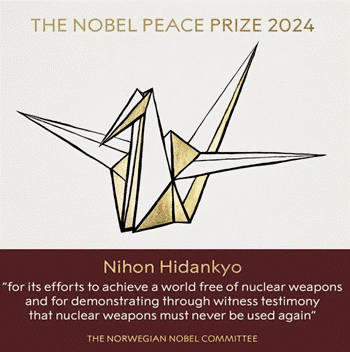
Overview of Nihon Hidankyo:
Foundation:
- Founded on August 10, 1956, as a national organization for Hiroshima and Nagasaki atomic bomb survivors.
- Created to unify Hibakusha voices, promote their welfare, and advocate against nuclear weapons.
Leadership Structure:
- Led by Hibakusha themselves, sharing first hand experiences to influence global policy and promote peace.
Key Activities:
- Advocacy: Pushing for nuclear disarmament through global platforms like the United Nations.
- Education: Raising awareness about the human and environmental impacts of nuclear warfare.
- Partnerships: Collaborating with groups like ICAN to support a treaty-based prohibition of nuclear weapons.
- Cultural Impact: Contributing to the global norm against the use of nuclear weapons since 1945.
- Importance of Their Work: Nihon Hidankyo has raised global awareness about the dangers of nuclear weapons and supported international disarmament efforts, despite challenges from countries expanding their nuclear capabilities.
-------------------------------------


